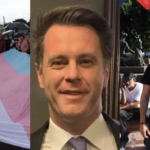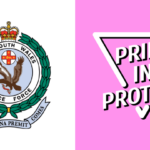NSW Labor Is Attempting to Kill Key LGBTIQ Reforms, Says Pride in Protest’s Rohen and Quay-Quay
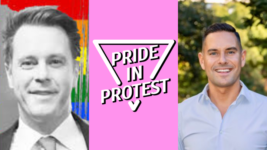
Independent member for Sydney Alex Greenwich introduced the Equality Legislation Amendment (LGBTIQA+) Bill 2023, into state parliament last August, which is an omnibus piece of legislation that facilitates a range of overdue rights amendments for LGBTIQA+ people.
And with the fresh NSW Labor government taking office and finding itself in the minority in March 2023, independents, like Greenwich, were holding more sway, and it seemed as if these tired old laws that served to prejudicially discriminate against queer people were finally going to be over.
However, it’s now gotten to the point that Pride in Protest is warning that the bill is about to lapse on 16 August, and if it doesn’t get brought up for debate in the NSW lower house over the next two sitting weeks, then the chance to protect the diverse reality of our community in law will be lost.
The changes that the Equality Bill would bring about include removing the surgery requirement for a change of sex on birth certificates, providing that sex work is a protected attribute in NSW antidiscrimination law and removing exceptions that apply to LGBTIQ people in that law.
NSW laws permit LGBTIQ discrimination
“I can be elected to the NSW parliament but could be fired as a teacher at the secular private school I went to, because of my sexuality,” Greenwich said in his 24 August 2023 second reading speech on the bill.
“Surely this is no longer acceptable in a modern NSW, and we do not need a review to tell us that.”
Most of us are familiar with the fact that the federal Sex Discrimination Act 1985 (Cth) permits religious schools to discriminate against teachers and students due to sexuality and gender. But few are aware that sprinkled throughout the Anti-Discrimination Act 1977 (NSW) are similar such laws.
Indeed, under NSW antidiscrimination law, private schools, religious and secular, can discriminate against LGBTIQA+ people in terms of allowing them to be students or barring them from being employed as teachers or from taking up any other position at the centre for learning.
Keeping it on the agenda
Pride in Protest has been pushing for the Equality Bill to be passed since before it was introduced into parliament. And now the group that’s really put pride front and centre within NSW protest over the last half decade, is raising the alarm that time is running out for this progressive bill to get up.
According to the queer rights group, aside from attempting to let the bill lapse, Labor may cut it up into sections to send for separate review, and in this way, they can pass a few uncontroversial measures, appear pro-LGBTIQA+ rights, and deny a hell of a lot of other needed reform.
Sydney Criminal Lawyers spoke to Pride in Protest members Rohen and Quay-Quay about why it’s gotten to the point that the bill may lapse and how Labor appears to be avoiding any attempts at removing LGBTIQ exceptions from antidiscrimination law or extending protections to sex workers.
Independent MP Alex Greenwich introduced the Equality Bill into NSW parliament on 24 August last year.
The bill covers a range of law reforms within multiple Acts that have long been campaigned on by the community but are still left outstanding and unprotected to this day.
Pride in Protest has long been calling on state parliament to progress the bill. And now it turns out if it doesn’t get up for the vote in the coming days, it will lapse.
So, Rohen and Quay-Quay, firstly, what does the Equality Bill cover? What changes are needed?
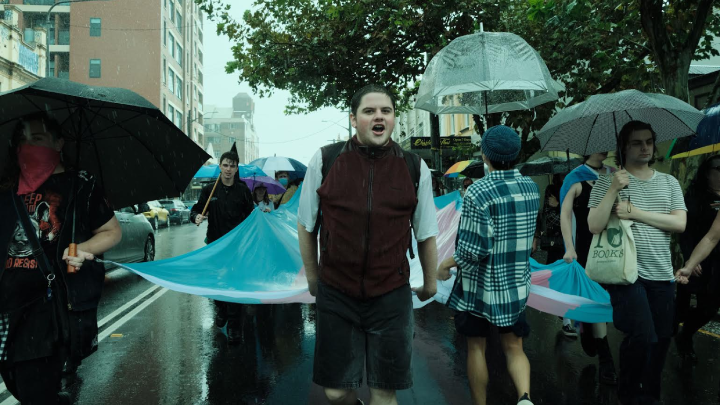
Rohen: The Equality Bill is a much-needed sweep of amendments proposed by Alex Greenwich to modernise old laws.
They include the right to self-identification, so it removes the requirement to have undertaken surgery in order to change the sex marker on your birth certificate, as well as other old laws around consent.
So, it’s helpful with things like advancing gender affirmation care. And there are a few other things, such as being able to choose the gender of the officers, who strip search you.
But a whole other chuck is antidiscrimination amendments. So, they’re what we’ve been fighting for.
These include the removal exceptions, which has been recommended for decades now, ever since the last NSW Law Reform Commission review of the Anti-Discrimination Act 1977 (NSW) happened back in the 1990s.
The other discrimination law changes it proposes extends the grounds for discrimination to sex work to protect sex workers.
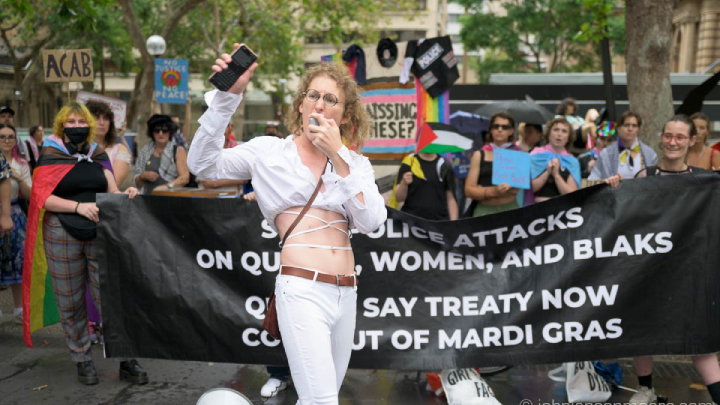
Quay-Quay: The bill acknowledges that historically a lot of queer people have had to turn to sex work as a means to obtain work that gives them autonomy and due to discrimination in the workplace.
The bill acknowledges that these laws are going to help sex workers and queer people together.
So, it is a matter of queer rights and workers’ rights.
So the bill does include amending the law regarding changing sex on birth certificates, so it no longer requires surgery. I believe, these days, no other jurisdiction in Australia imposes this restriction.
Rohen: Yeah. NSW is the most conservative state on that front, and you do need surgery to change the sex marker, which is just ridiculous, because a lot of trans and queer people don’t want or need surgery to self-identify.
We do consider it an important step, as well, but it is important to see this legislation realised in full.
Quay-Quay: The birth certificate issue leads to discrimination, because when people can see that the sex marker on your ID doesn’t match your gender, people can see concrete proof that you’re transgender.
This change is also important because there are a few bits and pieces of legislation in NSW that still hinge on birth sex markers, rather than identified gender, which is especially so in the case of prisons.
So, this is important for the material welfare of a lot of trans people.
The bill was referred to the Legislative Assembly Committee on Community Services on 14 March this year. And its final report was released on 3 June.
It found there were a range of diverse and conflicting views related to the legislation and its chief recommendation was that NSW parliament considers it.
How was the committee process in your estimates?
Rohen: Our position has been that the report and the inquiry were a sham. It promoted the idea that there are a range of diverse and conflicting views, but that’s comparing queer organisations, rainbow family networks, community legal centres and trade unions, such as the Nurses and Midwives’ Association and the NSW Teachers Federation, as well as domestic violence and health centres, with organised coalitions of Christian bigots, conservative gays, TERFs (trans-exclusionary radical feminists) and SWERFs (sex worker-exclusionary radical feminists).
That latter mix, who are against the bill, are not really a diverse mix of people, it is the organised right tackling everyday groups who are trying to fight for equal rights and those joining the cause to amend laws for the queer community.
That was reflected in the public survey as well. They outflanked us a bit. But there are suspicions around how they organised to fill out the survey.
And they’ve also popped up organisations just recently with the aim of making a submission to this inquiry.
Quay-Quay: It’s safe to say that the most useful finding from this is that Labor put in its own submission, and that’s what we consider they probably intend to do.
They’re very skittish on anything to do with antidiscrimination, sex work and trans autonomy. Labor was prioritising the power of police to exploit trans people in strip searches over our own rights to protect our privacy.
A huge issue is that they’ve given a lot of legitimacy to these fringe ideologies by putting them in the same basket as the experts.
It was intended to pull up any piece of ideological fluff. And now any individual member of parliament can use that information in the coming debate and claim it’s from an expert, when the reality is it’s just from a crank.
So, that’s how it went down. The Christian Lobby was given hours and hours. And I was in the room, and had to watch them advocate for gay conversion therapy, even though it had been banned a month before.
As you say, one of the key issues PiP has with the committee’s findings is that it’s shied away from the antidiscrimination laws it proposed for sex workers. And it considers that these protective measures should be sent to the Law Reform Commission for a separate review.
So, what is it about this outcome that’s particularly irksome for Pride in Protest?
Quay-Quay: Labor has taken the easiest route. It has taken the aspect that is the least controversial, which is self-identification, and they intend to pick that out and pass it to get brownie points for being pro-queer.
But the stuff that has huge potential for material change, they’re going to pass that on to the Law Reform Commission.
And they haven’t bound themselves to that, so it is going to potentially take years and years. And when it’s finally done, if they’re still in government, they can ignore all the findings, so it’s a throwaway.
They’ve guaranteed nothing on those issues.
Rohen: I would say, we don’t know for sure that they’re going to support self-identification yet. And the worst-case scenario within our community is that they itemise it and then put everything to different reviews and inquiries.
The amendments to the Anti-Discrimination Act have been consulted on, discussed and debated. So, they’ve been scrutinised in length and now Labor wants to scrutinise them even further.
And Quay-Quay is quite right, putting those laws to a review commission could take around the same time that the last review took, which was eight years and then, it’s provided to the government of the day to legislate.
The ground of sex work is important to put into the Anti-Discrimination Act, because it is a step forward for decriminalisation and it shouldn’t be further scrutinised because Labor doesn’t have a reason as to why these proposals need more scrutiny.
In fact, Labor has also rushed through amendments to antidiscrimination law prior to this, which we saw with religious vilification laws last year.
And you’re also talking about the exceptions that appear in this state’s Anti-Discrimination Act that exempt LGBTIQ people from certain forms of protection. How do you consider the committee process and Labor’s stance on these matters at present?
Rohen: You can tell by the way the private members bill has been treated. It has just been left to lie there and gather dust, while Labor sits on their hands, tries to appease the right and figures out the way it should move ahead.
Quay-Quay: To the point of the committee, there was definitely a framing in the room about queer people entering and invading religious spaces and whether we have the right to be in those spaces.
But the reality is the religious right controls a lot of social services in NSW, for example, social welfare and women’s shelters.
A lot of things like that are controlled by religious organisations and in order for queer people to access those, we put ourselves at risk of discrimination by potentially being completely refused by a service.
So, we have a government that won’t provide those services to the people.
And what is happening with this bill now that it’s been through the committee process? How has it got to the point that PiP is issuing warnings that it’s about to lapse?
Rohen: It comes to the point where Labor has to be decisive on the bill, because, as we’ve mentioned, it is going to lapse.
Quay-Quay: Essentially, it is Alex’s private members bill, but because it is a minority government, he has the balance of power, and he can put forward these bills.
So, over the next couple of weeks, he can raise it again, but it is at the government’s discretion whether or not to let it lapse or to let it be heard.
They’re putting it off because they think it is going to be a very messy and embarrassing debate.
They don’t want to bind the right to let it pass, because Chris Minns, himself, is a conservative Christian and doesn’t actually believe in the substance of the bill or the rights of queer people at all.
But they also don’t want the media to expose them all as queerphobic bigots, when they inevitably have a shouting match in parliament.
It is a very awkward moment coming, that they’ve been trying to put off forever. They think they can put it off forever, but I assume within the next two weeks, Alex is going to come collecting.
Labor doesn’t care about queer people, and for the longest time, they’ve been positioning themselves and fulfilling that niche of sensible conservatives in NSW.
Pride in Protest has also stressed that there is a looming debate in federal parliament over a new Labor version of Scott Morrison’s divisive Religious Discrimination Bill.
What does this involve? And why do you say it is vital that the Equality Bill does pass before the religious freedoms debate hits the federal agenda again?
Rohen: The religious discrimination debate is ongoing. There has been a Religious Discrimination Bill that has been drafted by federal Labor, but it is now shelved, because Albanese wanted it to have bipartisan support.
So, it is effectively, in the Liberals hands at this point.
The laws they’re presenting are unneeded. The laws that they’re trying for are there to serve and protect white Christians to be able to lawfully discriminate against queers.
It’s a worrying precedent. This Equality Bill has taken almost a year, but last year’s religious vilifications laws were rushed through parliament without much debate.
It does show that antidiscrimination amendments don’t need a decade long review to be legislated, and if we do see some support for removing exceptions, if by chance, Labor does support the Equality Bill, then it could lay precedent for that to happen with the federal bill.
But right now, from discussions at the Labor conference, it’s pointing towards Labor supporting protecting queer students and while that is an important step, workers need to be protected as well.
While kids might be protected, their queer caregivers won’t be.
Quay-Quay: Also, we don’t know what the makeup of how the two bills will interact when this is all done.
It is possible that the Religious Discrimination Bill at the federal level is actually quite anti-queer, so we need to maximise the potential for all the equality that we can be afforded by the Equality Bill at the state level.
And lastly, Rohen and Quay-Quay, as I said in the beginning, PiP has been calling for the bill to be passed for ages now.
And after the last state election, it seemed like the Equality Bill was an independent piece of legislation with widespread support, and it was time for such a bill to mend the holes in NSW LGBTIQA+ laws.
So, how are you expecting this to all play out from here?
Rohen: Ideally, we want the Equality Bill to be passed in full, because it is still discriminatory if we have Labor pass the right to self-identify but the antidiscrimination laws aren’t passed.
Because without those changes, the present laws are a continued threat: if you come out and declare you’re queer, you can lose your employment or if you come out as a sex worker, you can be denied housing services.
There is still discrimination there. The Equality Bill should be passed in full. And it can’t be itemised and put into different reviews, as at that point, Labor is just trying to appeal to the right wing.
Quay-Quay: What we are looking at now is a future where a transperson can use an accurate birth certificate to apply for a job as a janitor at a Christian school that they’re personally qualified for, but they get rejected because they are trans and continue to struggle with unemployment.
It’s going to be a farce. That’s a contrived situation. And it’s not the worst of it.
There have already been situations under the antidiscrimination exceptions that have clearly been discriminatory in their impact.
There was a Black mother who gave her child up for adoption to Anglicare, and the lesbian aunt was trying to adopt that child, so it would stay in the community, but because she was a lesbian, Anglicare had an excuse not to adopt her out to her aunt but rather rehomed her with a white family.
Rohen: There are consequences to Labor dragging its feet. And the Equality Bill is their decisive moment, to see if they will side with equality in full or not.
But after these two weeks, we’re still going to be fighting even if the independents throw in the towel. We’re still going to be fighting.
We’re going to be pushing for politicians to stop appeasing the Christian Right and trying to push religious discrimination laws, so they can lawfully discriminate against queers.
Quay-Quay: It is up to the community to make sure that this isn’t a moment where Labor can look good for supporting queer people, because it really isn’t.
I’m confident that we won’t let this die, and we will continue to chase these reforms.
Last year we voted that if the Equality Bill wasn’t passed in full that Labor would not be welcome at Mardi Gras.
I will personally continue to chase that agenda and I’m sure a lot of other queer people in the community will as well.
I will make sure that Labor is a pariah in this state and in this country, if they can’t get in line.


